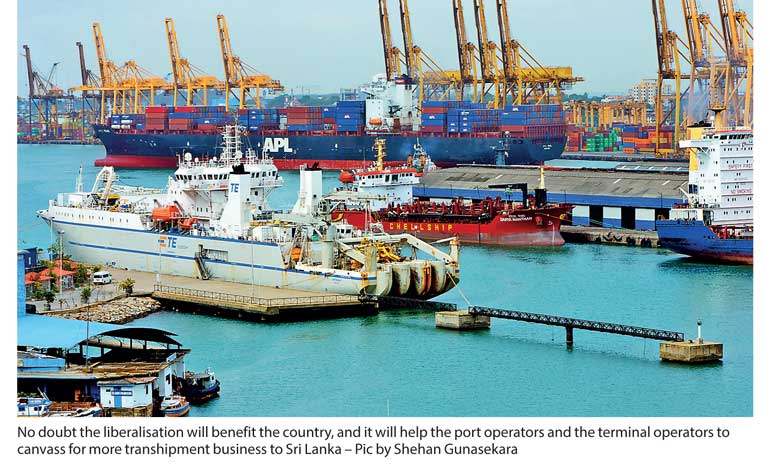Monday Feb 23, 2026
Monday Feb 23, 2026
Wednesday, 13 December 2017 00:00 - - {{hitsCtrl.values.hits}}
 “You can fool all the people some of the time, and some of the people all the time, but you cannot fool all the people all the time”
“You can fool all the people some of the time, and some of the people all the time, but you cannot fool all the people all the time”
– Abraham Lincoln
At the 2017 Sri Lanka Shippers’ Council AGM as the outgoing chairman, I urged the Government on the need for fully liberalising the shipping sector to reap the long-term benefits for Sri Lanka.
We certainly don’t believe in agency system which is an outdated model for shipping in almost all countries if they don’t add real value in the logistics chain, but our leaders failed to understand this for a long time and offered protectionism instead of competition and innovation. I commend the courageous act by the Minister of Finance and the Government for seeing things in the right perspective.
Since the Budget announcement of the policy, we have seen a massive effort to distort the benefits of liberalisation, by misleading the public in many angles by this small group of protectionists, it seems the same false story is published repeatedly written under different names. I was truly surprised for the first time that I learnt that Sri Lanka had so many maritime consultants defending against free market, freedom of choice and promoting agency business with government protected tariffs to make Sri Lanka the hub of the Indian ocean.
They are now ridiculing the Ports Authority capacity, charges, etc. to bring a different focus against the case of liberalisation and defending third party agents’ role as one of most major areas of the country’s maritime interest which is the core of the lobby’s argument which we the exporters, industry leaders and economist have clearly dismissed.
Obviously, the interest of few who benefits from commission and fees from all sides are at crossroads. These few agents are the ones who distorted the freight market for decades until the previous Government put a stop to the anticompetitive practices (2014) introduced by these agents and in simple terms “milked” the local exporters and importers and are still trying to do the same and are trying to once again introduce charges with the new Government blaming it on the last Government.
Until 2014, we exporters/importers in addition to freight faced up to 40 surcharges on top of separate illegal charge called THC. Today we pay an all-inclusive rate from point to point, which is market driven and transparent to the sellers and buyers of freight.
I still hold the original letter issued by CASA in 1997 introducing THC as a freight surcharge. The compliance of the law comes from principals, these agents are continuously trying to manipulate and charge more from exporters, importers and from shipping lines who are their principals making the way for unproductive costs which is passed to the consumer or the manufacturer/exporter, and this is still going on where ever they can with small exporters and importers.
Interestingly they are even trying to drag the clearing and forwarding agents into this, to show a big numbers of agency houses (such as 500) to the Government and the country. Clearing agents have no bearing on this subject  and they constitute over 300 numbers of small operators who work with customs and ports.
and they constitute over 300 numbers of small operators who work with customs and ports.
Propaganda doing
the rounds
The Government knows that five monopolised players are the ones who are blocking the country progress as stated by the Finance Minister in Parliament. Liberalisation will only help more SME and freight forwarding industry in the long run, contrary to the story published by the vested interest.
The propaganda caught my eyes to one fact which I must respond to educate the industry and the public. One of the maritime experts talking in an interview advert and explained how freight rates are determined, this statement exposes the years of lies they maintained over a separate charge called THC.
An article published on 27 November in the Daily FT says that, when determining freight costs, additional Terminal Handling Charges (THC) also constitutes part of line’s cost, and that they absorb it now. We are glad that under the fire of agency liberalisation now they have accepted the so-called THC they introduced separately as freight surcharge in 1997 was as part of a line’s freight cost. However, they then of course go on to lie again that has been absorbed by the line without passing on to the buyer or the sellers who negotiate freight. The Sri Lankan Government law does not ask anyone to absorb any cost but to charge it to the contracting party as an all-inclusive rate. This common sense is below Ordinary Level mathematics which they seem not to grasp.
Interestingly another consultant writes last week comparing the port cost. However, he has failed to say that he is not comparing apples to apples, as the examples were drawn from direct ports vs. a transhipment Port of Colombo, the agency author had purposely forgotten to mention that in Colombo the transhipment one-way load cost is less than the one-way load cost of direct ports of the countries he has cited. This is again to distort the reality, the one-way cost for transhipment in Colombo is around $37.5/TEU which are further negotiated on volume basis.
The expert had brought in the local loading cost for local exporters and importers and indicated that the SLPA should reduce it. We agree that the cost for local industry is high and wonder why these agents didn’t fight to reduce this for years if they were so concerned about the country and its exports, instead they called these Port Handling Cost (PHC) , now accepted as line’s cost, which were renamed as Terminal Handling Charges and simply milked the industry when principals on the other hand negotiated volume contracts and obtained massive reductions from the terminal operators which they never passed on to the customers for years.
In my opinion, CASA never fought for the export trade but acted against the trade always as they were only interested in the dollars they collected, but ironically called themselves the voice of shipping.
I am happy that their experts have now identified port cost incurred for loading and unloading identified as part of freight cost and are also calling it the PHC rather than THC. If they are ignorant I would like to educate them with the correct word as per global tariffs by ports including Colombo, the loading and unloading of a vessel is called “stevedoring” and is a known cost for a shipping line that can be added to freight under liner terms as published by their own tariff without crying foul and trying to avoid market forces whilst talking market forces when it comes to liberalisation.
Whenever THC was to be addressed by successive governments, CASA and few interested agency houses scared the successive governments saying ships will not come and transhipment will not grow, and freight rates will go up if the government stops and intervenes on anticompetitive practices. All these tactics have been proven beyond any doubt as utter lies.
Since the introduction of the anti-competitive laws in 2014, the port’s volumes have grown, making Colombo the second fastest growing port in the world, even with mega carriers operating larger ships, ship arrivals and new services are increasing, and the freight rates have come down as anywhere in the world due to market conditions.
These are the patriotic agents who were fighting against an all-inclusive rate against the exporters and importers who are now trying the nationalist card again to keep unproductive systems and keep Sri Lanka in the dark with its maritime aspirations for years to come. We also welcome the proposal of the Government to bring in a regulator as it is an important part of the reform structure as you liberalise the sector fully.
Government’s understanding is commendable
The Government’s understanding of this scenario is commendable. We as exporters and importers don’t want any party in between unless they are adding real value, they cannot claim the revenue that is brought through our freight payment and the ship’s payment to the port and terminal as their revenue, what they do is increase cost by sitting between and charging tariffs that are found nowhere in the shipping industry in the world and commissions that are artificially increasing cost to both the line/principal and the trade.
If they add value, liberalised or not, the ship owner will retain them and pay for the services rendered just like it is done in all other liberalised countries. No doubt the liberalisation will benefit the country, and it will help the port operators and the terminal operators to canvass for more transhipment business to Sri Lanka.
Already the world’s largest shipping line has formally conveyed this by publishing its appreciation and recognition of the Government effort to make Sri Lanka more attractive. I hope the port operator (SLPA) and the terminal operators will also inform the public of the benefits they will enjoy due to full liberalisation to their clients the shipping lines. If they are under pressure from few agents, please write to the Prime Minister and the Finance Minister extending their support, as the total export sector has endorsed this policy of the Government.
Finally, as an industry person, I would like to meet and invite Chathuranga Subasinge and Rehan Fernando and the new maritime experts to an open discussion with their views at a forum. I can be contacted via the Sri Lanka Shippers Council, I am aware that there are no such named people who I have met in my 30 years in the industry, but a gang of manipulators who are fearful to write even an article under their own name.
In closing I only can quote President Abraham Lincoln to these protectionists: “You can fool all the people some of the time, and some of the people all the time, but you cannot fool all the people all the time.”
(The writer is a Board Director of the Global Shippers’ Forum and the Immediate Past Chairman of the Sri Lanka Shippers’ Council.)